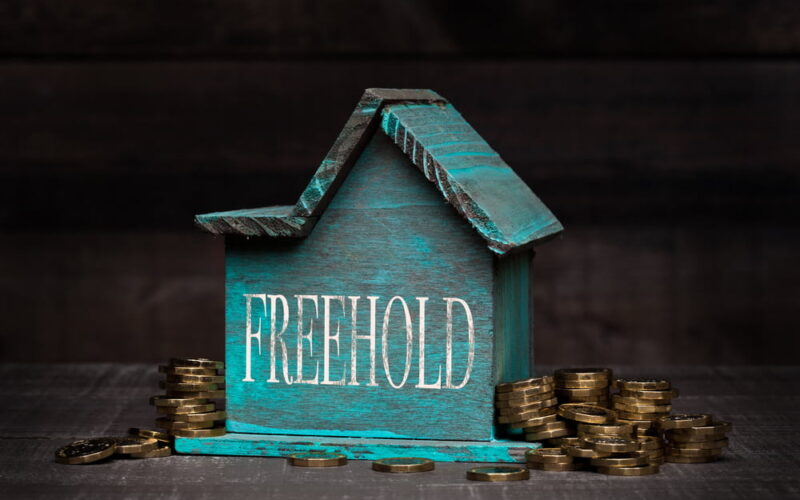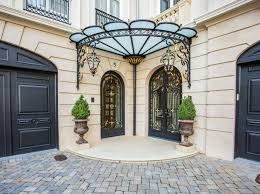Investing in real property can be cumbersome and confusing, especially if you don’t understand the concept. These properties have no fixed ownership timeline. However, this article entails what a freehold estate is, a comparison between less than a freehold estate vs non-freehold, its various types, and everything you need to know about this means of ownership.
What Is a Freehold Estate?
A freehold estate is a type of genuine property by which one has an unlimited right to enjoy the ownership of a property for an indefinite duration. When one owns property that can’t be movable and can also pass on indefinitely, it has no fixed length of ownership. One can transfer or sell the property to another individual. There is no definite termination date for ownership. You can think of it as “I own the property.” One of the characteristics it possesses is the specific rights about ownership.
It has two essential elements which are Immobility and Indeterminate duration.
#1. Immobility
The first element we will look at is immobility, which signifies that the land or anything on it is immovable.
#2. Indeterminate duration
This element implies that there is no fixed duration of ownership.
Types Of Freehold Estate
There are three types of freehold estates, and they are fee simple absolute, fee simple determinable, and life estate.
#1. Fee simple absolute estate:
This is one of the types of freehold estates. The owner has complete ownership without any form of restriction. The owner is unrestricted as long as he pays the taxes. Amongst the types of freehold estate, only this type grants the owner the right to pass on the property to the heirs indefinitely. For example, a father might purchase a plot of land for which the act states that the grantor transfers his property to the “grantee” (son) and his heirs. The grantee has the absolute right to possess the property (land), and he can do whatever with it, such as selling it, building, and growing crops. This type of estate deems to be perpetuity.
#2. Fee simple determinable estate:
Fee simple determinable is also one of the types of Freehold estate. It is an estate that will automatically end when the person who received the property does not fulfill the condition. It is created when a grantor transfers a property (land) conditionally. In the situation whereby the conditions are not met, the interest will revert to the grantor or the heirs of the grantor. For Instance, Mr. Raymond grants a fee simple determinable interest in the property to David and his heirs, while the property is in use for a poultry business. As soon as the property starts being in use for another business purpose, the interest will revert to the grantor. The condition can also be that the land will be used for religious purposes. If the person violates the conditions of the land the ownership of the land will automatically be violated.
#3. Life estate:
A life estate is also one of the types of Freehold estate. It is the ownership of a property for the duration of the tenant’s life. It ends at death when the ownership of the property may revert to the actual owner, or it can pass to another tenant. The holder of a life estate has the full right to own the property during their lifetime. The life tenant also pays applicable taxes while in possession of the property.
An example of a life estate is when a parent conveys a property for the life of a child. However, the holder must refrain from damaging the property. He should also ensure they are always in the right state, to allow another tenant to have them. Amongst all the types of freehold estate, this one grants an individual interest in a property as long as they live. The individual that occupies the property is known as a “Life Tenant”.
Less Than a Freehold Estate:
The key factor of a less than freehold estate is the limitation of time. One can also call it a leasehold estate. It also implies when you possess an investment property and rent it out to a tenant. The tenant will hold a less than a freehold estate.
Non-Freehold Estate
Non-freehold estates are not inheritable. You have a limited time and right to use or possess the property but don’t own. One can also call it a leasehold estate.
In a nutshell, a non-freehold estate does not permit the tenant to pass down their rights to their descendants. The tenant can live in the property as long as he pays his rent, but he does not do any form of modification without the consent of the owner. The owner of the actual property makes all decisions. One can also see it as a common lease. Unlike the freehold estate, the non-freehold estate does not provide individuals with a limitless duration of property possession. This type of property is generally called a non-freehold estate, so you can call it a leasehold estate or less than a freehold estate.
Types Of Non-Freehold Estate
There are four types of non-freehold estate. They include: estate for years; estate from year to year, Tenancy at will, and Tenancy at Sufferance.
#1. Estate for Years:
A common feature of it is the agreement between a landlord and a tenant whereby the landlord rents a property for a specific amount of time. He or she is required to pay rent according to the rental agreement. He or she is also allowed to enjoy and possess the property within the time limit required, but the landlord doesn’t permit him to commit damage or pass down the property.
However, the agreement specifies the exact date that the tenant can take possession of the property, as well as a specific date when the owner can take over the property. With these types of leases, there is no need for the property owner to issue any type of notice to vacate the premises since the end date on the contract serves as the date that the tenant must quit the property or be subject to additional penalties and possible legal action.
#2. Estate From Year to Year:
Estate from year to year automatically renews annually. It is a leasehold that renews itself annually until terminated by notice or the owner. One can also call it estate from period to period. For example, a tenant’s one-lease can be from 31st May 2022 to 31st May 2023. Once the leave expires, the tenant expects the tenant to leave or renew the rent as agreed. A written contract enforced by the court seals the estate for years of the agreement. This implies that both parties cannot terminate before the date unless both partners reach an agreement.
#3 Tenancy at Will:
A tenant at will implies when one has the landlord’s permission to stay beyond the formal tendency, it has no fixed amount of time. Tenancy at will is whereby the landlord or tenant can probably terminate the lease at any time. It is usually advantageous to both parties. Both parties can quickly adjust the rental terms without breaching a contract. The lease is not legally valid as both parties don’t draw up a written formal agreement.
#4 Tenancy at Sufferance:
This occurs when a tenant continues to live at the apartment after the rental agreement expires. Both parties usually sign a lease agreement that allows the tenant to stay even after the rent expires.
Both parties will reach an agreement, which can be that the tenant will pay up the rent before vacating, another condition or agreement can also arise if not this.
Freehold Estate vs. Non-freehold Estate
Whether people clearly tell the difference between freehold vs non-freehold estate doesn’t change the fact that both differ in definition and in practice. In dealing with freehold vs non-freehold estates, we will first examine what both mean and then highlight their key differences. A non-freehold estate, which is also known as a “leasehold estate”, is created through a lease or a rental agreement.
Freehold Estate vs Non-Freehold Estate: Key Difference
- The distinguishing feature, by contrast with a freehold estate, is that a non-freehold estate must have a duration that is certain in time. It does not require a minimum or maximum term. Both parties must agree on a term. For instance, a lease can be for 5 years, 4 years, etc. However, the owner can grant a lease indefinitely with the capacity to terminate on notice. while the other has an unlimited time duration.
- Generally, non-freehold estate ownership is an ownership type in which properties on the land are leased to tenants for a certain tenure. The ownership of the land belongs to the actual owner (freeholder). However, freehold is the ownership of both the property and the land on which it has been built. When an individual purchases a freehold property, he/she is purchasing the property and the land it sits on. In contrast, if you purchase a non-freehold property, you’re purchasing the property and not the land it sits on. Furthermore, when you purchase a freehold house, you will be its owner until you decide to sell it or pass it on to someone else. Unlike when you purchase a house with a lease or a rental agreement, you will own the property for a specific or limited amount of time. Once the lease runs out, the ownership of the property reverts to whoever owns the freehold property, and it also requires an annual land rent based on the written agreement.
- Finally in comparing freehold vs non-freehold estate, a freehold estate owner has the power and freedom to enjoy and use the estate as he deems fit while the other owner has exclusive and limited rights over the property.
What Is the Difference Between a Freeholder and a Landlord?
These are often used interchangeably. A freeholder is the person who owns the freehold of the building but he becomes a landlord when he grants a lease.
What Happens When a Freeholder Dies?
The property goes to a new freeholder. The new freeholder inherits the property through a valid will or through the rules of intestacy.
What Is the Difference Between Freehold and Leasehold?
Simply put, in freehold, there is complete ownership of both property and the land for an indefinite period of time. On the contrary, only the property is owned, not the land upon which the property is built. This is for a set period of time.
What Is the Most Common Freehold Estate?
A fee simple absolute property is the most common freehold estate. Here, the owner can use the property as he see fit. He can decide to sell, lease or bequeath the deed whenever he wants to.
What Is the Difference Between Freehold and Non-Freehold?
A freehold is when an individual has full ownership of the property and land. While, non-freehold is when an individual pays rent on a property.
Conclusion
Estates in land can be broadly classified as either freehold or non-freehold. A freehold estate indicates ownership, a non-freehold estate can also refer to as a Leasehold estate which involves a lease and rental arrangement. Both estates are, by their nature, immovable real estate. The non-freehold estate is quite inferior to the other.
FAQs On Freehold Estate
What does it entail to own a freehold estate?
Owning a freehold estate involves when the freeholder is responsible for all the budget costs which include the tax, the freeholder owns everything including the land on which it’s built.
Are freehold estates a good investments?
Yes, it is because it is a lifetime investment and has an unlimited time of ownership. Freehold estate investment is also a very profitable investment as it can be rented, sold, and also used for other commercial purposes.
When can a freeholder take my property?
A freeholder can take your property when the conditions of the rental agreements are not met. A freeholder can also take your property when the agreed time limit exceeds, the owner will have every right to take away the property.






